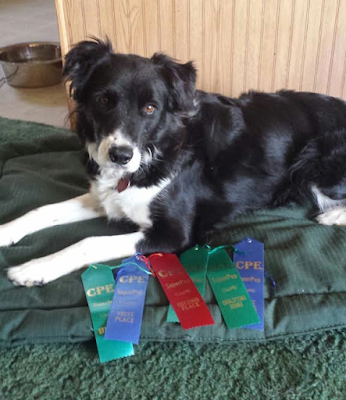Those who incorporate deliberate corrections into their training often object to +R based training on the basis of the fact that nobody is ALL positive.
Personally, I consider this to be a diversion, at best. This objection actually has nothing to do with how +R based trainers work, it has nothing to do with learning, and it has nothing to do with the dogs themselves.
But here is the kicker . . . +R based trainers will be the first to acknowledge that nobody is ALL positive.
I realize that the descriptor "purely positive" is still being used by some, but I personally have never met a +R based trainer who uses that label to describe his or her training. I have heard descriptors such as: +R, Force Free, LIMA, Relationship Based, Positive (leaving off the "purely"), Aversive-Free, Coercion-Free, Humane Hierarchy, Science Based, Clicker Trainer, etc.
I did make inquiries, and apparently there are still a handful of trainers who refer to themselves as "purely positive". I leave it to them to explain and defend their training choices.
However, do realize that the vast majority of +R based trainers firmly reject the use of the term "purely positive", and we would appreciate it if those who are striving to debunk our training would attempt to do so on the basis of what we are actually doing and not because a label that very few actually even use.
I digress . . . back to the topic at hand.
Objection is still made in response to those who refer to themselves as +R, or "positive", or force-free, etc.
Examples:
"Nobody can be all positive all the time".
"You use force - don't you use a leash?"
"You can't train with only one quadrant".
I would submit that using a descriptor to explain how one trains, such as +R, positive, force-free, etc. actually does not imply that anyone can be "positive all the time", that there aren't times when it is necessary to restrict a dog's freedom, or that anyone is actually trying to train "with only one quadrant".
How can that be?
Think of it this way. Does a vegetarian only eat vegetables? Of course not! The term "vegetarian", generally speaking, is understood by most to mean, "this person does not eat meat". So, the vegetarian will usually eat grains and dairy products, as well as vegetables.
Imagine if I went online and started talking with vegetarians, and then began to object to them by saying, "nobody can eat ALL vegetables!" or "you can't be a vegetarian, you eat bread, don't you?"
I would be missing the point entirely!
The much better questions would be, "what foods do you eat?", "why do you choose not to eat meat?", "what challenges do you face as a vegetarian?", "why do you enjoy eating a vegetarian diet?"
Those who object to +R based training, regardless of what descriptor the trainer uses to identify his or her training choices, on the basis of what it "can't mean" would do much better to ask, "what does this person mean by this?"
Breaking it Down
No, a +R trainer does not only train through positive reinforcement. Using the term +R to describe one's training indicates an underlying mindset that regards the dog as a partner who brings as much into the training process as the trainer.
A force-free trainer is not allowing his or her dog to run wild in the world, free of all boundaries and rule structures. The term force-free, this context, indicates that the trainer uses training techniques and methodologies that do not include aversive tools such as prong collars, use of physical corrections, or, very often, use of verbal corrections. Of course a force-free trainer uses leashes, although in a neutral way, as a safety measure (or, to comply with the law), not to manipulate or correct the dog.
A positive trainer is not trying to claim that life is always sunshine and flowers for the dog. I would propose that good positive training can provide a dog with a very high level of discipline and challenge.
Conclusion
When it comes down to it, any particular term that anyone uses to describe anything can be twisted, manipulated, and misinterpreted.
And yet - we need vocabulary. We need to be able to describe, distinguish, differentiate, identify, categorize, and communicate!
We have to do the best we can even with terms that cannot describe our training perfectly.

No comments:
Post a Comment